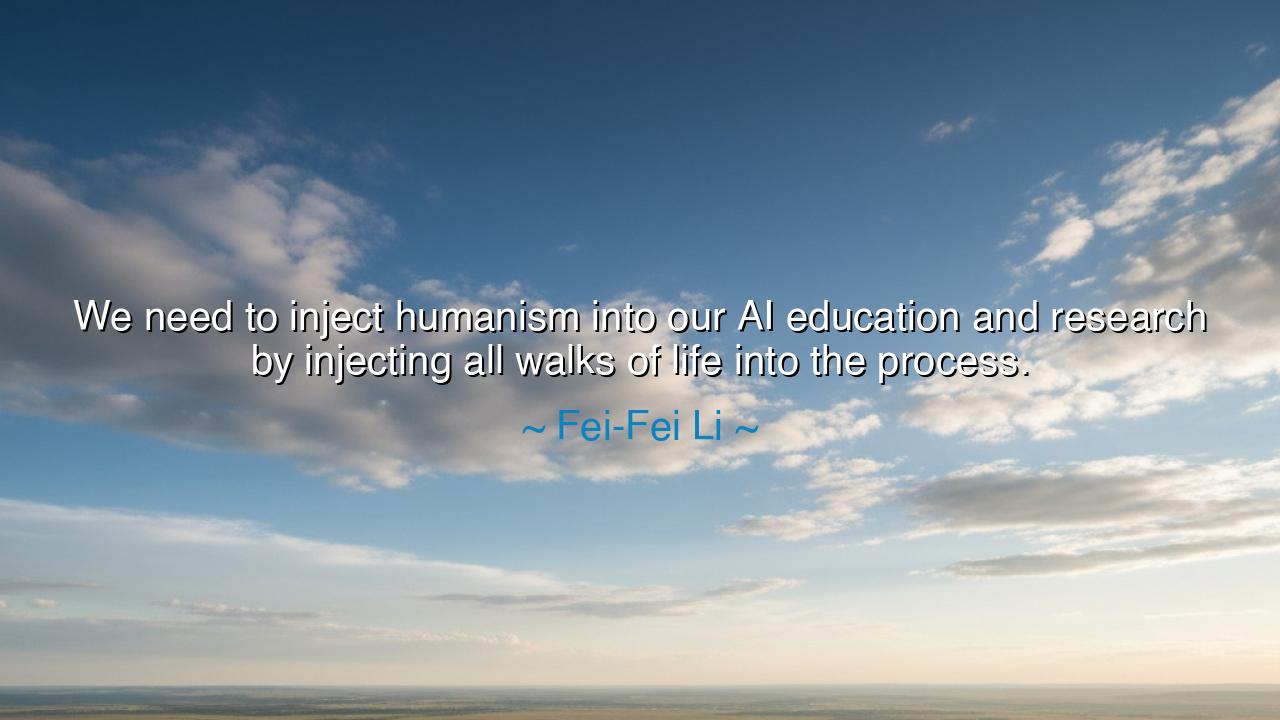
We need to inject humanism into our AI education and research by
We need to inject humanism into our AI education and research by injecting all walks of life into the process.






Hear now, O seekers of wisdom, the words of Fei-Fei Li, a pioneer of the age of machines and learning, who has proclaimed: “We need to inject humanism into our AI education and research by injecting all walks of life into the process.” This is no small utterance, but a call like the trumpet of battle, summoning us to guard the soul of humanity even as we forge the engines of the future. For the danger lies not in the strength of the machine, but in the emptiness of the spirit that guides it.
The origin of these words comes from a life spent in both science and compassion. Fei-Fei Li, who helped give birth to modern artificial intelligence through her creation of ImageNet, saw not only the power of machines to perceive, but also the peril of machines built without the wisdom of the heart. She knew that AI research cannot be left in the hands of technologists alone, for without humanism, without the voices of poets, philosophers, teachers, doctors, and dreamers, it risks becoming a tool that serves only profit or power, rather than the flourishing of mankind.
Consider, O listener, the story of the Industrial Revolution. Great machines were built, mighty engines roared, and wealth was multiplied. Yet in the shadow of smokestacks, children labored in factories, and the poor suffered in misery. Why? Because the age was driven by industry but not guided by humanism. Only when reformers, teachers, and voices of conscience rose to demand justice did the machines become servants of humanity, rather than its masters. In this story lies a mirror for our own time, for AI is the new steam engine, and if built without care for all walks of life, it too may enslave rather than liberate.
Thus Fei-Fei Li counsels that we must weave diversity of voices into the loom of AI. The farmer must speak, for he knows the land; the healer must speak, for she knows the body; the philosopher must speak, for he knows the soul; the artist must speak, for she knows beauty; the mother must speak, for she knows love. Without their wisdom, the machine will reflect only the narrowness of its makers, and the world it shapes will be impoverished. But with them, AI education will grow rich, balanced, and humane, a mirror of the fullness of human life.
Let us not imagine that this task belongs only to scholars or rulers. Each of us must labor to ensure that technology is joined with ethics, that progress is guided by compassion. Teach your children not only to code, but to care; not only to calculate, but to question. Support the schools that bring together science and the humanities, so that the next generation of builders may also be guardians of the human spirit. For without such joining, we risk creating a world that is efficient, but soulless—prosperous, but unjust.
The lesson, then, is clear: do not separate knowledge from wisdom, nor invention from morality. AI research must not become the domain of the few, but the shared endeavor of the many. Practical actions are within reach: demand transparency from those who build the algorithms; call for voices from every community to shape their design; and in your own life, remember that every use of technology carries a moral weight, a choice between harm and healing.
So let us answer Fei-Fei Li’s call with courage. Let us be the generation that weds the brilliance of the machine with the compassion of the soul. Let us ensure that humanism is not forgotten, but engraved in the very foundations of our future. For if we succeed, we shall not only build machines of power, but a civilization of justice, wisdom, and light.






AAdministratorAdministrator
Welcome, honored guests. Please leave a comment, we will respond soon